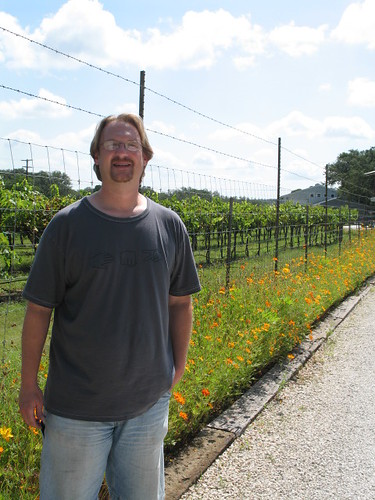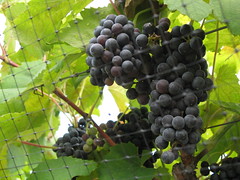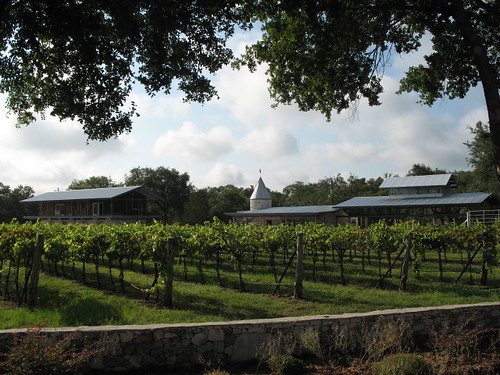Interview: Jeffery Ivy, Dry Comal Creek Vineyards
 Jeffery Ivy: Texas boy goes off to seek his winemaking fortune in California, and returns to make a difference in Texas wine. Now, this is the kinda story I like very much. Having started his career as a retailer in Austin, he soon found that the retailing biz was less than rewarding, and so began harvesting and cellar work for the likes of Slaughter-Leftwich, Gregory Graziano (Domaine St. Gregory) and Quivera and even tucked in a bit of distillation experience at Germain-Robin, makers of "some of the best brandy on the planet, bar none" in Mendocino County. Finally making his way to head winemaker over a course of a decade (Roshambo Winery, Healdsburg), he felt the tug to bring his winemaking skills home.
Jeffery Ivy: Texas boy goes off to seek his winemaking fortune in California, and returns to make a difference in Texas wine. Now, this is the kinda story I like very much. Having started his career as a retailer in Austin, he soon found that the retailing biz was less than rewarding, and so began harvesting and cellar work for the likes of Slaughter-Leftwich, Gregory Graziano (Domaine St. Gregory) and Quivera and even tucked in a bit of distillation experience at Germain-Robin, makers of "some of the best brandy on the planet, bar none" in Mendocino County. Finally making his way to head winemaker over a course of a decade (Roshambo Winery, Healdsburg), he felt the tug to bring his winemaking skills home.Jeff is the new winemaker for Dry Comal Creek winery, a small but very cute winery way out in the Western Hill Country near San Antonio. Dry Comal Creek is famous for their eye-catching labels and for a previous vintage of a dry style wine from Black Spanish, or Lenoir grapes. The former recognition is a positive one; the latter is not. Said Black Spanish wine is very, very bad. Other wines they make are pretty good. They're just not Texas wines. Because of the difficulty in finding good grapes in this part of the Hill Country, many small outfits like Dry Comal Creek source their fruit from outside the state. Texas is not the only state who does this, not by a longshot. But all the same, I think it is a consumer's right to know this.
Jeff is working not only to improve that poorly made Black Spanish, but to use his knowledge to make the Dry Comal Creek line a distinctive one. One of the ways Jeff has correct the Black Spanish issue is to make a rose from it, a cool blended summer wine that is perfectly nice. That's what happens when you have a good, experienced winemaker who can turn around trouble. Take note, people.
Interview with Jeffery Ivy, Dry Comal Creek
C & D: Take me back to what it was like to come back to Texas after your California adventures. What did you find here?
Jeff: I had always thought when I moved to California that someday I would come back. I didn't think I would have the capital to buy property or start a brand in California. Someone like me who wants to have a little place, grow a few acres of grapes and make a little bit of wine, it's just not feasible unless you have a whole lot of money to start out with. So Texas was a better situation because my family owns land here already. When I talked to my friends here that were still in the business, it seemed like there was a renaissance going on here...(Texas) went from forty wineries to over a hundred in less than ten years. That told me two things: one, that there were people with money who were willing to start things, and two, that they might need a professional winemaker. I think the thing that cemented it for me was that I was here in November of '05 for the New World Wine and Food Festival in San Antonio and shared a winemaker dinner with Kim McPherson and tasted his viognier and his rose and I was like, well, if these wines can be made in Texas, then I'm on board. They were very good wines, and I'm not even talking just solid or clean, they were very good, they were distinctive. Some of the wines from Jim Johnson...I'm like, this can be done here. There's just another level of dedication that has to be here. You don't have the quality of your base resource like you do in California. People might disagree with me, but it's pretty easy to make wine in California because you have an abundance of really good grapes. Whereas in Texas, if you're trying to make wine from Texas grapes you don't always have the luxury of quality fruit.
So what sort of thing do you have to do to compensate for that in the winemaking process?
A lot of years, because of the weather, you're not going to get the grapes as ripe as you'd like them. Sometimes you have to bump the sugar up to get the alcohol you want. Tropical rainstorms that come off the Gulf...it rains for two weeks straight, and your grapes are stuck at 18 brix and going nowhere. Sometimes it's so hot that they shut down for the season. You either pick them or you're left with raisins. Especially in the Hill Country. Maybe that's not such an issue in the High Plains, I don't know. With reds in Texas you have to deal with the fact that you have a much shorter growing season, and with vinifera you don't have the development of tannins and...not a lot of color to work with. You have to augment that. The point I'm trying to make is that here you have to be prepared to augment to make the wine you want to make.
Tell me what you walked into, coming into Dry Comal Creek.
Well, the winery was a bit of a mess. There were wines in tank that had not been managed, at all. They were contaminated with bret, that had to be dealt with. I also had to clean barrels that hadn't been maintained. And I knew that was what I was walking into, that the winery had been neglected by the previous winemaker, and that was one of my first jobs, was to clean the place up. But I've seen worse in California, it's not exclusive to Texas. One of the things I had to do was to start developing sanitation protocols, things that get done regularly, all the time.
Currently, the majority of the wine you make comes from fruit sourced from California and other states. What dictates where you get these grapes?
In the past, it has been price. I know that, for example, the sauvignon blanc and the chardonnay come from Temecula, that was a contact that was brought to us by a consulting winemaker, Dr. Enrique Ferro. I still use him...he's a nice resource to have because he's a great chemist and I'm not a chemist.
Now those come to you as juice, correct?
Yes. Or in some instances, it comes as finished wine. The sauvignon blanc comes as finished wine. The colombard comes as juice, which is good because...one, it's unique and no one does it, and two because it's readily available, and Franklin has a good relationship with California Concentrate who processes the juice for us.
If suddenly all your dreams came true, in terms of available resources, what you could get your hands on, and what you could do, what would that look like?
I'd like to have a 10 to 20 acre vineyard, and estate vineyard that was planted with syrah, grenache, mourvedre, some cinsault, maybe...I'm still working out in my head what varieties will do well here...
Now by here, do you mean the Hill Country?
I'm talking about the Northern Hill Country, San Saba County, because that's where my family has land. I've always had this idea that I'd have a ranch. And not just about grapes, you know, I'd have peach trees or pecan trees...just have a farm. And it wouldn't necessarily have to be huge...I'm not in this business to get rich. That's not why I do it. I do it because I love to make wine.
*****
Texas Wine Question O' The Day: Why should I call wine made from California or New Mexican grapes Texas wine? Let me know.
Clinkies.






10 Comments:
Wine made from California grapes is California wine. New Mexico grapes, Mew Mexican wine.
The location of the winery makes no difference. The identity of the winemaker can make a difference, but wine is about place. That's exactly why so many countries name their wines after places, not grapes.
I'm for full disclosure when it comes to fruit origin. To that end, American or Californian, or Texas wines at the state level still don't tell you much about the place the wine was grown, because there's no unifying terroir to those names.
Texas wine is wine made from fruit grown in Texas, just as California wine is wine made from grapes grown in California. That's basic fact, no other way to look at it.
I agree wholeheartedly, but as a retailer, I saw plainly how people understandably assumed that if the label said 'Texas' then it was Texas wine. I think it's important to make sure everyone understands what they're buying, not just us geeks.
I agree with Christian as well. I think it is disingenuous to mislead consumers as to the origin of wine or juice. We make two wines from Texas now; Black Spanish and Chamboucin. But if you want to blame me as the winemaker for the decisions of the owner, you can just piss off. I came back to Texas to make Texas wines; if you know of a winery that is committed to Texas wine,that can pay the salary of a professional winemaker with ten years of experience, let me know. Everyone I interviewed with prior to Dry Comal Creek is doing the exact same thing, bringing in juice or finished wine from outside the state. And I dont exactly hear High Plains growers banging on the door eager to sell fruit.
Hey Jeff, you sound like you feel slighted...read my piece again, because I give you the *credit* for turning Dry Comal Creek towards the right direction:
"Jeff is working not only to improve that poorly made Black Spanish, but to use his knowledge to make the Dry Comal Creek line a distinctive one. One of the ways Jeff has correct the Black Spanish issue is to make a rose from it, a cool blended summer wine that is perfectly nice. That's what happens when you have a good, experienced winemaker who can turn around trouble. Take note, people."
There's no blame here. This is just a blog of opinion, and mine is: if you make wine out of California grapes, it should be indicated on the label. That's not a jab at you at all, and there's nothing in the article that jabs you as winemaker, as far as I can tell.
If there's truly something about my article that requires my "pissing off", then let me know personally via email. Otherwise, please be sure you're being insulted before you get nasty on my blog.
And it's not even if the label says Texas. People assume that Texas "brands" are making Texas wines, whether they are or not.
Maybe I'm supposed to piss off, but I didn't say anything either other than to answer the question about what to call wine grown in other states . . .
Personally, I'm excited for you and for the industry, Jeff, if Dry Comal is going to move in the direction of making distinctive Texas wines. Are they? I'm excited to see someone with your winemaking experience coming into the state and I hope that you'll devote your talent to working with Texas grown fruit.
There is undeniably a problem with fruit sourcing in Texas right now, and historically. 2006 is not a good vintage for me to get on a high horse and demand Texas fruit in all Texas wines, but it is certainly a legitimate goal for the industry, I think, and a goal that everyone needs to embrace for the industry to truly progress.
You said it yourself, Jeff that there is a lot of good fruit in California. But it's not a luxury, it's a necessity. Great wine is made from great fruit. and great fruit is found by planting lots of vineyards and figuring out which ones are good.
There is a lot of good fruit in Texas too, but not enough to go around. Almost all of the good growers are under contract but almost all of them are willing to expand too. That just doesn't help anyone in the near term.
I encourage you to visit as many established vineyards as you can. You can see the difference right there in the field between the good ones and the bad ones.
I'll be completely honest about my opinion of the Dry Comal label. I think it deceives the consumer and when I was a retailer, I wouldn't sell it to someone looking for Texas wine. I sold the dry Colombard and the Sauvignon to people looking for good dry whites, but I always explained the fruit source issue. Moreover, I once asked a Dry Comal representative, not sure who it was, point blank whether the wine (the colombard) was grown in Texas. He said it was when it wasn't. That's more than disingenuous. What is Texas styled about California juice?
That's not your fault Jeff, and I hope you can do something to change it, because you sound like you're committed to Texas wines, but that commitment, in my opinion, has to include sourcing Texas fruit, whether that means planting them yourself or signing contracts with other growers.
Jeff,
I feel your pain. High Plains are VERY reluctant to expand their vineyards. The last crash was SOOO severe that the pain is still felt and abandoned vineyards litter the landscape. Farmers up here all know the story and more importantly so do their bankers. We can grow wonderful wine up here at a price point that will make everyone smile but we must unring that bell that tolled over the broken fortunes of so many growers back in the late 80's and early 90's. Winegrowing is and can be economically rewarding but growers have learned to vet prospective wineries very carefully, we have taken way too many wooden nickels in the past. Come on up and visit with growers. The Newsom field day is a great time to see everyone and gain a feel for what we can do.
I had the pleasure of recently visiting with several of the panhandle growers. I learned that they are growing and planting grapes that current wineries are requesting and contracting. Of course, this makes perfect sense. However, in my opinion, this is where the problem started long ago. Most Texas Wineries are trying to make wines from grapes that grow well in California. The obvious reason for this is that is what the owners and winemakers like to drink and what their customers like to drink. I think we all agree it is time for a change in Texas winemaking. It starts with the wineries having more of a partnership with the vineyards and learning what grapes not only grow well in Texas, but also on each particular piece of land. This is not a novel concept, vineyards have been doing this for centuries in Italy, France, Germany and Spain and for over a hundred years in California. Texas winemakers and growers need to work together and find the grapes for the state of Texas. This will take an education that starts first with the vineyard. It will then take an education of the consumers at the wineries. Until we get here, Texas will continue to be the step child in the wine industry. Despite the losses that Bobby points out several of the farmers in the panhandle are moving to grapes because of water issues with the depleting Ogallala aquifer. Seeing the curve ball coming some of the farmers are moving from peanuts and cotton, which is what they currently farm, and requires more water and less return per acre. By necessity, this is how we get more Texas wines, but we need to quit going about it like we have for the past several years and pull our head out of the sand and grow up as wine producing state.
Well said, guy. You're preaching my gospel.
I just stumbled upon this blog site and found this string very interesting. I am new to Texas and have just discovered the Texas Wineries. In fact the last winery I visited was Dry Comal Creek winery, which I thoroughly enjoyed. Unfortunately they were out of their Black Spanish wine, which I would have loved to have tried.
On the same trip I also visited a two other wineries and discovered that not all Texas wines come from Texas grapes. The one winery had mostly Australian grapes (or juice) with some New Mexico and Washington. I have to admit I was disappointed to learn that. While I liked several of their wines, I was there to experience Texas wines; good, bad, or indifferent. The next winery I went to was just down the road and they do exclusively estate bottled wines. I enjoyed most of them and was pleased to have a Texas wine. I also discovered a Texas Zin.
As someone who enjoys wine but would not consider myself a connoisseur I would like to have wines labeled as to the origin of the grapes. For me visiting the Texas wineries is an experience that goes beyond the wine itself.
I am glad I discovered this site.
Doug Smith
wow gOLd,Buy
WOw goLd,World of
wOW gold.We are professional
WOW gOld store on line. We
provide cheap wow Gold to each
loyal and reliable customer
Post a Comment
<< Home